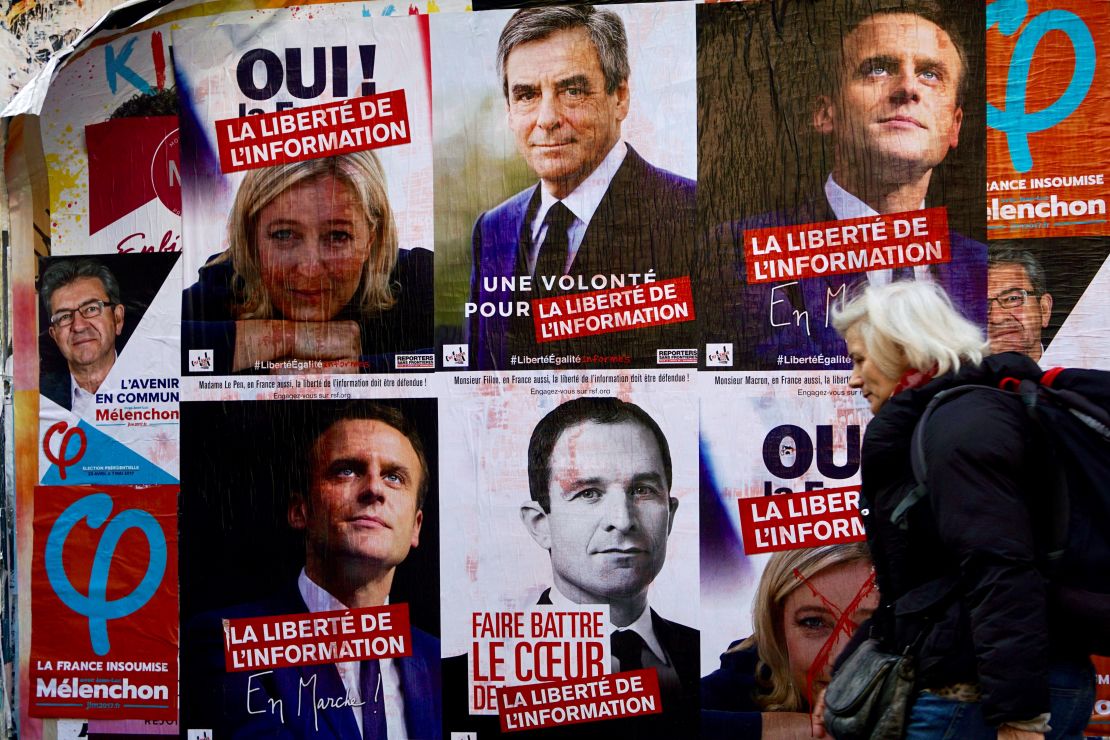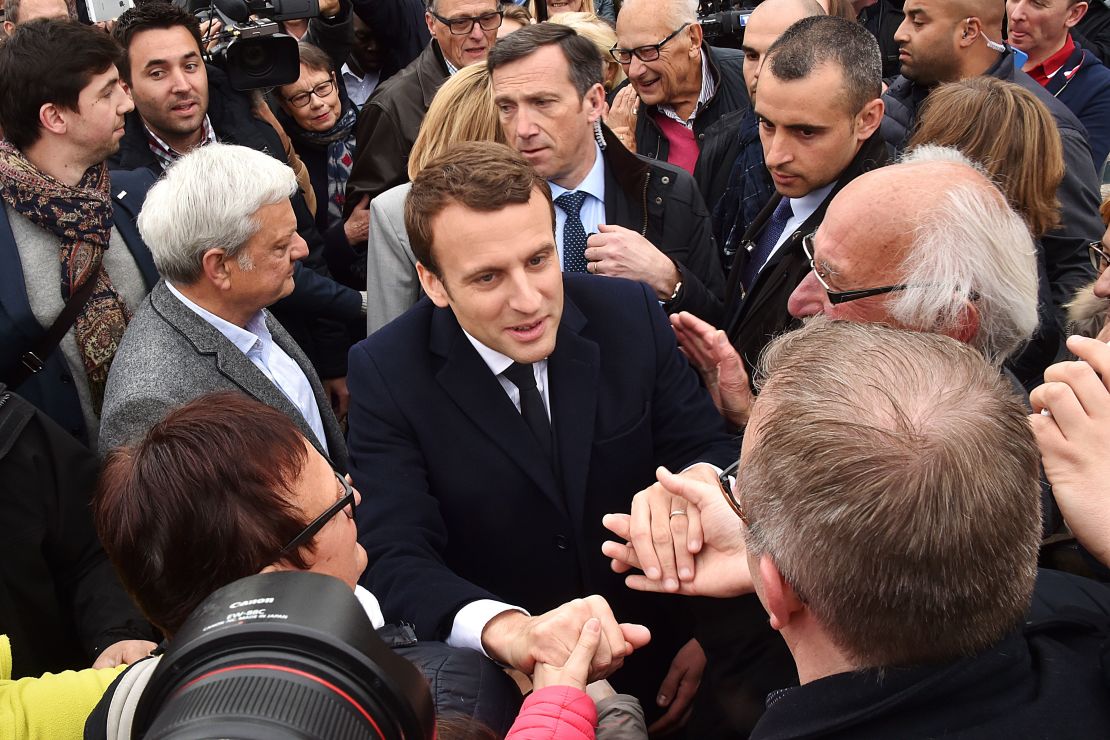Story highlights
Emmanuel Macron and Marine Le Pen through to the second round presidential vote
"It's a political earthquake," says veteran French journalist Christine Ockrent
Defeated candidates rally behind Macron against far-right Le Pen
Voters in France have comprehensively snubbed the country’s political establishment, sending far-right populist Marine Le Pen and political novice Emmanuel Macron through to the second round of the country’s presidential election.
With 97% of polling stations declared, newcomer Macron was leading the field with 23.9%. National Front leader Le Pen was close behind on 21.4%
The result upended traditional French politics: Neither candidate hails from the establishment parties that have dominated the country for decades.
It was a stunning victory for Macron, 39, a former investment banker who has never before stood for elected office and now becomes the favorite to become France’s next President. “We did it,” he told jubilant supporters.

It was also a success for Le Pen, who has spent years attempting to rid the Front National of the toxic legacy of her father. “It is time to free French people from arrogant elites … I am the people’s candidate,” she declared. But it was not the comprehensive breakthrough for the far right that some had predicted.
Macron remains the frontrunner, and the markets moved to reflect that. The euro jumped against the dollar to its highest level since November as investors bet that the chances of Le Pen winning power were fading. Stocks got a lift too – futures markets indicated gains of more than 0.5% for the main Dow Jones and S&P indexes.
Political sea change
The result mirrored others – such as the British vote to leave the European Union and the US election of Donald Trump – where voters have rejected traditional elites. “It’s a political earthquake in this country and in Europe,” veteran French journalist Christine Ockrent told CNN.
Scandal-hit conservative François Fillon and far-left wildcard Jean-Luc Mélenchon trailed in third place and were knocked out of the closely-fought race. Le Pen and Macron are now set to face each other in a runoff election on May 7.
Speaking in Henin-Beaumont, a Front National stronghold in northern France, Le Pen rallied her supporters to her anti-immigration, anti-European Union message.
“The French people must seize this opportunity, because the enormous challenge of this election is the wild globalization that puts our civilization at risk,” Le Pen said.
“Either we continue to disintegrate without any borders, without any controls, unfair international competition, mass immigration and the free circulation of terrorists, or you choose France with borders,” she added.
Her advancement to the second round is not without precedent – her father, Jean-Marie Le Pen, made it to a runoff against the then-incumbent Jacques Chirac in 2002, only to suffer a devastating loss when anti-extremist voters rallied against the National Front leader.
Novice victory

A huge cheer went up at Macron’s campaign headquarters as news of the results came through. “France’s political map is tonight redrawn,” said CNN’s Melissa Bell, who was at the scene.
“Macron’s is a remarkable achievement, because he represents optimism,” Ockrent said.
As his supporters waved Tricolour flags, and those of the EU, Macron told a rally in Paris he would carry “the voice of hope that we want for our country and for Europe,” into the second round.
“The two political parties that have governed France for years have been discarded,” he said.
“The deep … feeling which has led our people to love our country and overcome its divisions is spectacular,” he said. “You have shown that the hope of our country was not a dream but a relentless and benevolent will.”
Tight security
Sunday’s first round contest was held under tight security after a terror attack in Paris Thursday night disrupted the final day of campaigning Friday.
By 5 p.m. local time (11 a.m. ET) 69.42% of France’s 47 million registered voters had cast their ballots, according to the Interior Ministry – a marginally lower turnout than at the same point in 2012.
With 11 names on the ballot, no single candidate had been expected to win an outright majority; instead the top two candidates will face a second and final ballot on May 7.
The incumbent President, socialist François Hollande, whose approval ratings have remained in the doldrums for several years, made the unusual decision not to run for a second term.
National Front denounced
As the results became clear, French politicians and several of the defeated candidates appeared to throw their support behind Macron – or to speak out against Le Pen.
Prime Minister Bernard Cazeneuve tweeted an appeal to all voters to back Macron in the second round, “to combat the National Front’s disastrous project to take France backwards and to divide the French people.”
The Socialist Party’s candidate, Benoît Hamon secured just 6.4% of the vote, with 97% of the results counted.
Speaking at his campaign headquarters, Hamon said he took full responsibility for the poor result, and urged his supporters to vote for Macron to defeat Le Pen in the second round, “even if he is not left-wing.”
Fillon, the mainstream Republican candidate, was an early favorite for the presidency, but his campaign stumbled because of a scandal over claims he paid his wife and children for work they did not do. He denies any wrongdoing. As counting neared completion he trailed Le Pen in third with less than 20% of the vote.
He told his supporters, “we have to choose what is preferable for our country, and I am not going to rejoice. Abstention is not in my genes, especially when an extremist party is close to power.”
“The party created by Jean-Marie Le Pen has a history known for its violence and intolerance,” Fillon said. “Its economic and social program will lead our country to failure … I promise you, extremism can only bring unhappiness and division to France.”
Macron vs. Le Pen on the economy
Outsider
Macron, 39, a former banker, has never held elected office, though he served as economy minister under Prime Minister Manuel Valls.
But he attracted support from left and right with promises to boost the economy and improve security. His party, “En Marche!” which was only created in September, now has more than 200,000 members and his meetings have attracted vast crowds.
Far-right National Front leader Le Pen, 48, is best known for her anti-immigration rhetoric; she told supporters her first move as president would be to impose a temporary ban on legal immigration to France. She has also vowed to take France out of the EU.
Far-left firebrand Mélenchon, whose popularity surged in the final weeks of the race following impressive performances in the television debates, has so far refused to concede defeat, but said he would accept the final results when they came in.
“We do not recognize the score announced on the basis of opinion polls,” he wrote on Facebook. “The results of the larger towns and cities are not yet known,” he added, calling for “restraint” and urging commentators to “be cautious.”
CNN’s James Masters, Saskya Vandoorne, Hilary McGann, Oceane Cornevin, Carol Jordan, Stephanie Halasz, Laura Smith-Spark and Angela Dewan contributed to this report.





















